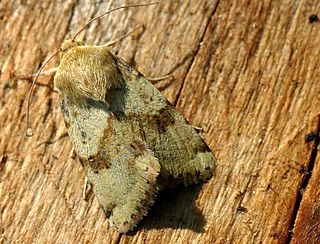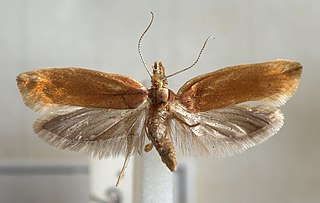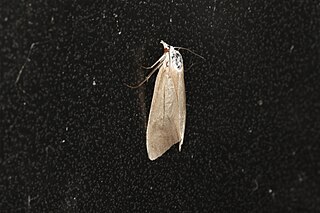
Cirrochroa thais, also known as the Tamil yeoman, is a species of nymphalid butterfly found in forested areas of tropical Sri Lanka and India. It is the state butterfly of the Indian state of Tamilnadu.

Heliothis viriplaca, the marbled clover, is a moth of the family Noctuoidea. It is found in Europe and across the Palearctic to Central Asia then to Japan, Korea and Sakhalin. In the south, it penetrates to Kashmir and Myanmar. As a migratory moth, it also reaches areas in northern Fennoscandia in some years. North of the Alps, both indigenous and immigrant individuals occur in certain areas. The heat-loving species occurs mainly on dry grasslands, fallow land, heathlands and sunny slopes and slopes and the edges of sand and gravel pits.

Cataclysta lemnata, the small china-mark, is a moth species of the family Crambidae. It is found in Europe, Morocco and Iran.

Ypsolopha ustella, the variable ypsolopha moth, is a moth of the family Ypsolophidae. It is found in most of Europe and is also present in North America.

Hadula melanopa, the broad-bordered white underwing, is a moth of the family Noctuidae. The species was first described by Carl Peter Thunberg in 1791. Subspecies H. m. melanopa is found in northern Scandinavia; subspecies H. m. rupestralis is found in the Alps, the Balkan Mountains and the Apennine Mountains; subspecies H. m. brunnea is found in mountainous areas of Great Britain and subspecies H. m. koizumidakeana is found in Japan.

Ectoedemia intimella is a moth of the family Nepticulidae which is found in Europe. It flies in June and July and the larva mine the leaves of willows from July to November.
Phyllonorycter melanosparta is a moth of the family Gracillariidae. It is known from South Africa, Zimbabwe and western Kenya. The habitat consists of secondary woodland where forest flora intermixes with savannah plants.

Cochylis hybridella is a moth species of the family Tortricidae. It is found in most of Europe, the Near East, China, Japan, Korea and Russia.

Swammerdamia caesiella is a moth of the family Yponomeutidae. It is found from most of Europe to Japan. It is also present in North America, where it is possibly an introduced species.

Scirpophaga incertulas, the yellow stem borer or rice yellow stem borer, is a species of moth of the family Crambidae. It was described by Francis Walker in 1863. It is found in Afghanistan, Nepal, north-eastern India, Sri Lanka, Bangladesh, Myanmar, Vietnam, Thailand, Malaysia, Singapore, Sumatra, Java, Borneo, Sumba, Sulawesi, the Philippines, Taiwan, China and Japan.
Scirpophaga gilviberbis is a moth in the family Crambidae. It was described by Philipp Christoph Zeller in 1863. It is found on the Comoros and in the Democratic Republic of the Congo, Kenya, South Africa, Zambia, India, Indonesia, Myanmar, Singapore, Thailand and Vietnam.

Scirpophaga imparellus is a moth in the family Crambidae. It was described by Edward Meyrick in 1878. It is found in Australia, where it has been recorded from Queensland, New South Wales and Victoria.
Scirpophaga marginepunctellus is a moth in the family Crambidae. It was described by Joseph de Joannis in 1927. It is found in Botswana, the Democratic Republic of the Congo, Madagascar, Mozambique, Nigeria, Senegal and Sudan.
Scirpophaga ochritinctalis is a moth in the family Crambidae. It was described by George Hampson in 1919. It is found in Angola, the Central African Republic, the Democratic Republic of the Congo, Ghana, Malawi, Nigeria, Sierra Leone, Tanzania, Uganda and Zambia.
Scirpophaga ochroleuca is a moth in the family Crambidae. It was described by Edward Meyrick in 1882. It is found on New Guinea and in Australia, where it has been recorded from Queensland.
Scirpophaga subumbrosa is a moth in the family Crambidae. It was described by Edward Meyrick in 1933. It is found in the Democratic Republic of the Congo, Ethiopia, Ghana, Madagascar, Malawi, Mozambique, Nigeria, Senegal, Sierra Leone, Sudan, Tanzania and Zambia.
Scirpophaga virginia is a moth in the family Crambidae. It was described by Schultze in 1908. It is found in China, Taiwan, Japan, Bangladesh, Vietnam, Thailand, Sri Lanka, western Malaysia, Singapore, Borneo, Sumatra and the Philippines.
Antaeotricha ostodes is a moth in the family Depressariidae. It was described by Lord Walsingham in 1913. It is found in Guatemala.

Asaphodes albalineata is a species of moth in the family Geometridae. It is endemic to New Zealand and has been observed on Stewart Island / Rakiura. This species is similar in appearance to Asaphodes oraria but can be distinguished as it has an unusual pattern on the underside of its hindwings. It inhabits open hill tops and adults are on the wing in December.

Epinotia subocellana is a species of moth of the family Tortricidae. It is found in Asia and Europe and was first described by Edward Donovan in 1806.











